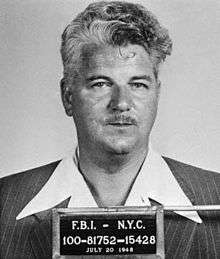Eugene Dennis
| Eugene Dennis | |
|---|---|
 Eugene Dennis in 1950 | |
| Chairman of the National Committee of the Communist Party USA | |
|
In office 1957 – 31 January 1961 | |
| Preceded by | William Z. Foster |
| Succeeded by | Elizabeth Gurley Flynn |
| General Secretary of the National Committee of the Communist Party USA | |
|
In office 1945–1959 | |
| Preceded by | Earl Browder |
| Succeeded by | Gus Hall |
| Personal details | |
| Born |
Francis Xavier Waldron August 10, 1905 Seattle, Washington, United States |
| Died |
January 31, 1961 (aged 55) Mount Sinai Hospital Manhattan, New York, United States |
| Political party | Communist Party USA |
| Spouse(s) | Peggy Dennis (née Regina Karasick) |
| Children | Eugene Jr. |
| Occupation | Lumberjack, teamster, electrician, politician |
Francis Xavier Waldron (August 10, 1905 – January 31, 1961), best known by the pseudonym Eugene Dennis and Tim Ryan[1] was an American communist politician and union organizer, best remembered as the long-time leader of the Communist Party USA and as named party in Dennis v. United States, a famous McCarthy Era Supreme Court case.
Biography
Early years
Francis Xavier Waldron was born on August 10, 1905 in Seattle, Washington. He worked in various jobs and was a member of the Industrial Workers of the World, for which was active in California as a union organizer.
Political career
Waldron joined the Workers (Communist) Party in 1926.[2]
In 1929, Waldron fled to the Soviet Union to avoid criminal charges for his political activities under the California Criminal Syndicalism Act.
Waldron returned to the United States in 1935 and assumed the pseudonym of Eugene Dennis. Dennis became General Secretary of the party after the expulsion of Earl Browder and was a staunch supporter of the Moscow line.

On July 20, 1948, Dennis and eleven other party leaders, including Party Chairman William Z. Foster were arrested and charged under the Alien Registration Act.[3] Foster was not prosecuted due to ill health.
As Dennis and his co-accused had never openly called for the violent overthrow of the United States government, the prosecution depended on passages from the works of Karl Marx and Vladimir Lenin that advocated revolutionary violence and on the testimony of former members of the party who claimed that Dennis and others had privately advocated the use of violence.
After a nine months trial and the imprisonment of the defense lawyers for contempt of court, Dennis and his co-defendants were found guilty and sentenced to five years imprisonment. They appealed to the Supreme Court of the United States, which ruled against the defendants on June 4, 1951 by a vote of six to two in Dennis v. United States, 341 U.S. 494 (1951). The Court later scaled back its Dennis opinion in Yates v. United States, and rendered the broad conspiracy provisions of the Smith Act unenforceable.[4] Eugene Dennis was imprisoned in the years 1951-1955, according to the verdict in his case.[5]
Dennis remained general secretary until 1959, when he succeeded Foster as party chairman, and held that position until his death in 1961.
Espionage connections
Though never charged with any act of espionage, Dennis was identified in the Venona project as being a source for Soviet intelligence during World War II. In the transcripts, Dennis is referenced as a contact for a group of concealed Communists in the Office of Strategic Services and the Office of War Information.
Dennis is referenced in the following Venona transcripts:
- 708 KGB Moscow to Mexico City, 8 December 1944
- 1714 KGB New York to Moscow, 5 December 1944
- 55 KGB New York to Moscow, 15 January 1945
Death
Eugene Dennis died of cancer on January 31, 1961.
He was buried at the Waldheim Cemetery[6] (now Forest Home Cemetery), in Forest Park, Illinois.
Writings
- The elections and the outlook for national unity., New York, Workers Library Publishers, 1944
- America at the crossroads: postwar problems and communist policy., New York, New century publishers, 1945
- Marxism-Leninism vs. revisionism., New York, New Century publishers, 1946 (with William Z. Foster, Jacques Duclos, and John Williamson. Foreword by Max Weiss.)
- The people against the trusts; build a democratic front to defeat reaction now and win a people’s victory in 1948., New York, New Century Publishers, 1946
- What America faces: the new war danger and the struggle for peace, democracy and economic security., New York, New century publishers, 1946
- Let the people know the truth about the Communists which the un-American committee tried to suppress., New York, New century publishers, 1947
- Eugene Dennis indicts the Wall Street conspirators. New York : National Office, Communist Party, 1948
- Ideas they cannot jail., New York, International Publishers, 1950
- Letters from prison. Selected by Peggy Dennis., New York, International Publishers, 1956
- The Communists take a new look., New York, New Century, 1956
Footnotes
- ↑ The Cold War: Cold War espionage and spying.
- ↑ Joseph R. Starobin, American Communism in Crisis, 1943-1957. Cambridge, MA: Harvard University Press, 1972; pg. 13.
- ↑ Video: Berlin Siege. Gen. Clay Returns To Report On Red Crisis, 1948/07/22 (1948). Universal Newsreel. 1948. Retrieved February 20, 2012.
- ↑ http://law.jrank.org/pages/12626/Yates-v-United-States.html
- ↑ http://slovari.yandex.ru/~книги/БСЭ/Деннис%20Юджин/
- ↑ "Browse by City: Forest Park". Findagrave.com. Retrieved 2008-05-05.
Further reading
- Louis Budenz, Men Without Faces: The Communist Conspiracy in the USA. New York: Harper, 1948; pg. 252.
- Peggy Dennis, The Autobiography of an American Communist: A Personal View of a Political Life, 1925-1975. Westport, CT: L. Hill, 1977.
- John D. Gordon III, "The Dennis Case, Communist Bail Jumpers, and Oliver Ellsworth's 'Outlawry' Bill," American Communist History, vol. 14, no. 2 (Aug. 2015), pp. 105–134.
- John Earl Haynes and Harvey Klehr, Venona: Decoding Soviet Espionage in America. New Haven, CT: Yale University Press, 1999.
- Ann Kimmage, An Un-American Childhood. Athens: University of Georgia Press, 1998; pp. 21–22, 120.
- William M. Wiecek, "The Legal Foundations of Domestic Anticommunism: The Background of Dennis v. United States," Supreme Court Review, vol. 2001 (2001), pp. 375–434. in JSTOR
| Party political offices | ||
|---|---|---|
| Preceded by Earl Browder |
General Secretary of the CPUSA 1945–1959 |
Succeeded by Gus Hall |
